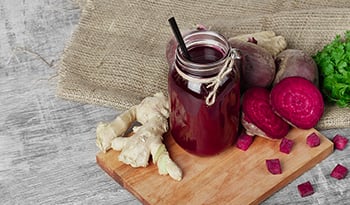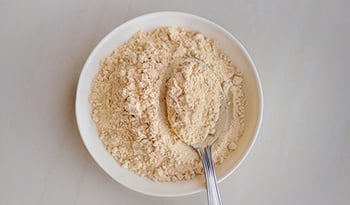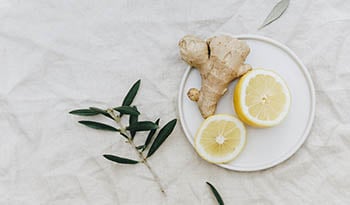The Health Benefits of Dandelion Root
DISCLAIMER:This blog does not intend to provide diagnosis...
- In this article:
- Dandelion History and Use
- Dandy for Your Health
- Promotes Gut Health
- Fights Constipation
- Reduces Water Retention
- Soothes Varicose Veins
- Tames Psoriasis
The common dandelion, Taraxacum officianale, is generally viewed as an annoying, invasive plant that’s challenging to control, but it’s actually a wonder weed with marvelous health benefits that range from improving digestion to controlling psoriasis.
The bright, yellow flowers of the dandelion that turn to fluff are the harbinger of wishes for children and a nightmare for your lawn. That’s because a mature dandelion plant has a long, thick taproot that is difficult to remove. Once established, the dandelion plant will sprout season after season spreading its seeds via the wind across gardens, lawns, fields, golf courses and even cracks in the pavement.
Dandelion History and Use
First mentioned as a medicine by Arabian physicians in the 10th and 11th centuries and later in the 1200s by Welsh healers, dandelion has been used as a laxative, stomach remedy, skin toner and treatment for arthritis, warts, PMS and kidney stones for centuries. Its name comes from the French dent de lion— teeth of the lion—because of the tooth-like serrations on the plant’s leaves, which funnel water to the root.
Native to Eurasia, the dandelion was introduced to the rest of the world as an important component of food and medicine. The plant is an excellent source of vitamin A, vitamin K and vitamin C; a good source of fiber, calcium and potassium and contains more protein (1.5 grams per cup) than spinach. The greens also contain vitamin E, folate and other B vitamins.
Dandelion root, which is responsible for the majority of the plant’s medicinal properties, is best harvested in June, July and August when most bitter. Leaves can be picked anytime, but are tastier in the spring when young and tender. They’re a wonderful addition to salads either raw or lightly blanched and can be treated like spinach—boiled, seasoned and served as a vegetable. The dried leaves are used in digestive drinks and herbal teas, the dried root makes an excellent coffee substitute, and the flowers can be used to make wine or beer.
Dandy for Your Health
The Latin name for the plant, Taraxacum officinale comes from the Greek tarazos (disorder) and akos (remedy) named for the plant’s healing ability. Generally stimulating to the body, dandelion is a natural laxative, diuretic and hepatic. It enhances kidney and liver function and increases the frequency of urination. While there are no human studies yet to support its efficacy as a treatment for cancer, animal and in-vitro studies have shown dandelion root extract's ability to effectively fight colon and liver cancers.
While it’s always wise to consult your physician prior to taking any herbs or supplements, dandelion appears to be safe and free of major toxicity and negative side effects. Here are some of the health benefits of this powerful plant.
Promotes Gut Health
Suffer from stomach bloating, indigestion or other gut issues? Dandelion root makes a wonderful tea that soothes the tummy, promotes digestion and increases bowel movements. It stimulates the production of bile, a fluid secreted by the liver and stored in the gallbladder, that helps break down fat. Dandelion root is also high in inulin, a type of soluble fiber found in plants that supports the growth of healthy gut bacteria.
If you frequently experience stomach upset, try drinking a cup of dandelion tea each day and see if it helps. It can also be sweetened with a little honey or mixed with other gut soothing roots such as ginger and licorice.
Fights Constipation
According to the National Institute of Diabetes and Digestive and Kidney Diseases, constipation is one of the most widespread digestive problems in the United States, affecting about 16 percent of adults and 33 percent of those over 60. Causes include:
- Poor diet that’s low in fiber
- Certain medications
- Some medical conditions
- Dehydration
- Lack of exercise
Small doses of herbs with laxative properties including dandelion, Cascara sagrada, rhubarb root, ginger and barberry can help you feel normal again.
Reduces Water Retention
Fluid retention, also known as edema, occurs when the kidneys do not adequately eliminate water. Women may experience it during pregnancy or PMS. Edema can also be due to kidney or heart disease.
To reduce swelling and blood pressure, doctors often prescribe diuretics, or water pills, to help the body eliminate fluids. Potassium is often washed out with the water, resulting in low potassium levels, which can be dangerous--especially for people with heart disease. Dandelion is a wonderful diuretic because in addition to being effective, it is naturally high in potassium.
Soothes Varicose Veins
Varicose veins occur when veins become enlarged, swollen and twisted. They can appear anywhere in the body but are most common in the legs. Inactivity, obesity, pregnancy and anything that decreases leg circulation can increase your risk. Treatments include: eating more fruits and vegetables and getting adequate amounts of vitamin C, vitamin E and B-complex vitamins. If water retention is part of the problem, dandelion used as a diuretic can help to relieve symptoms.
Tames Psoriasis
Psoriasis, a chronic inflammatory skin condition that causes red, scaly patches—especially on the elbows, knees and scalp—is a problem that affects up to 2% of people living in the western world. While there is currently no cure for psoriasis, it’s important to get a correct diagnosis and understand individual facts such as stress, diet and work-life balance that may trigger it.
Several plants, including dandelion, may help reduce symptoms. A healthy diet, regular exercise and sunshine can also help relieve the condition. Creams that contain comfrey, aloe vera or vitamin D may also ease irritation.
The next time you see those yellow flowers or white balls of fluff, think twice before cursing the dandelion. Consider it a friend that can help you on your path towards healing and wellbeing.
References:
- https://www.sciencedirect.com/topics/medicine-and-dentistry/taraxacum-officinale
- https://www.niddk.nih.gov/health-information/digestive-diseases/constipation/definition-facts
- https://www.ncbi.nlm.nih.gov/pmc/articles/PMC5739857/
- https://pdfs.semanticscholar.org/2d3c/7b118a7d60b06f65082d96ed1164fd008df4.pdf
- Ovadje P, Ammar S, Guerrero JA, Arnason JT, Pandey S. Dandelion root extract affects colorectal cancer proliferation and survival through the activation of multiple death signalling pathways. Oncotarget. ;7(45):73080–73100. doi:10.18632/oncotarget.11485
- Vandeputte D, Falony G, Vieira-Silva S, et al. Prebiotic inulin-type fructans induce specific changes in the human gut microbiota. Gut. 2017;66(11):1968–1974. doi:10.1136/gutjnl-2016-313271

 By Dr. Ellen Albertson, PhD, RDN, NBC-HWC
By Dr. Ellen Albertson, PhD, RDN, NBC-HWC


